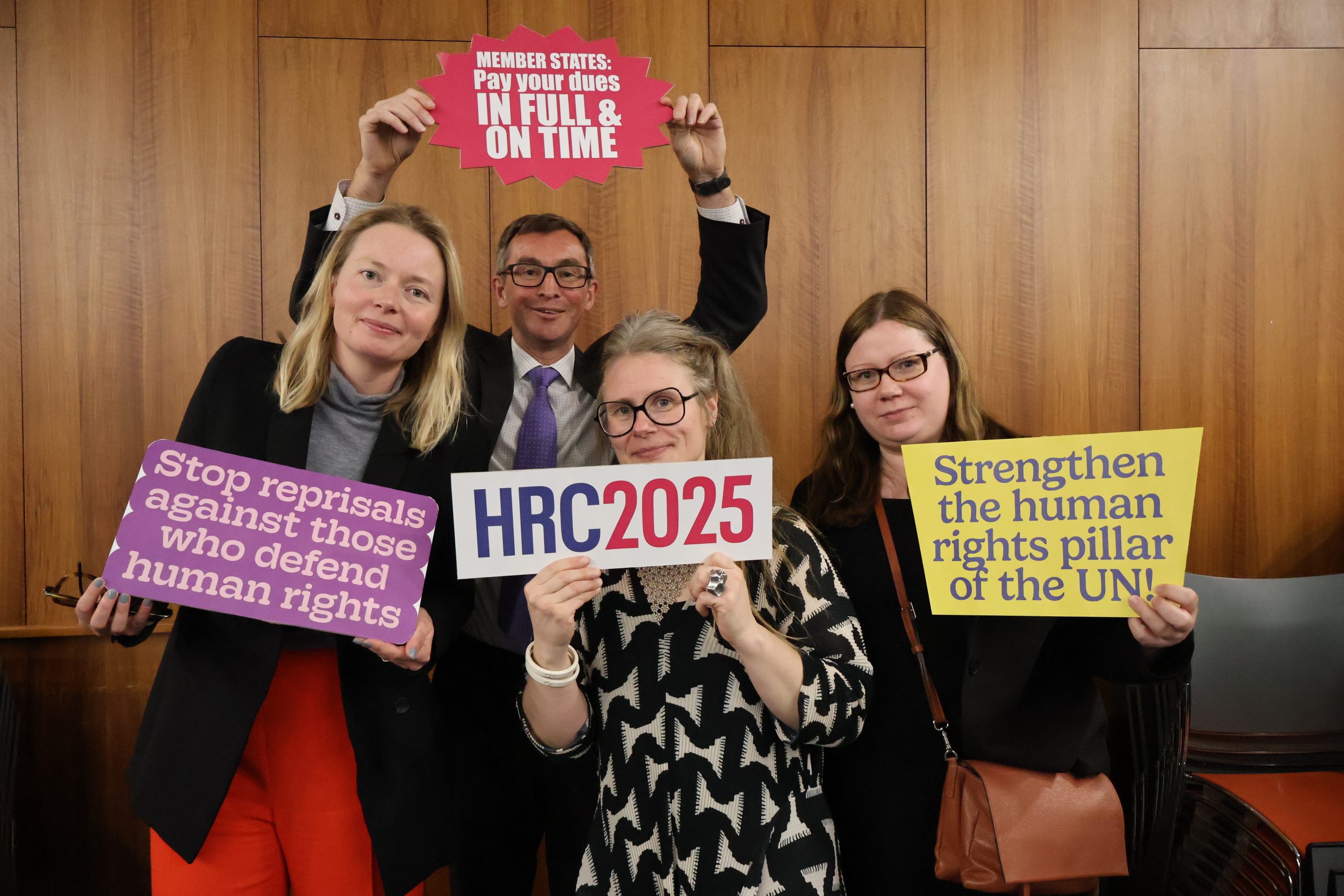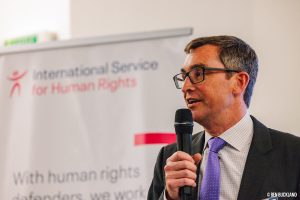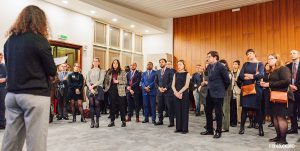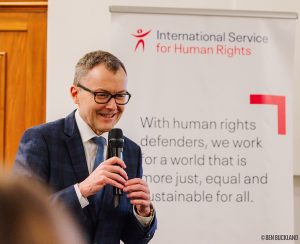Photo: Ben Buckland

Priorities for the Human Rights Council President and States in 2025
The beginning of a new year coincides with the appointment of a new President for the Human Rights Council. On 11 February, ISHR hosted a civil society reception to welcome the 2025 President, Swiss ambassador Jürg Lauber, providing an opportunity for civil society, human rights experts, supporters and diplomats to meet and discuss challenges and opportunities in the year ahead.

Photo: Ben Buckland
The event gathered around fifty participants from human rights NGOs and permanent missions to the UN in Geneva. Welcoming them, Phil Lynch, ISHR’s Executive Director, outlined that we were living in a time of existential challenge but also critical opportunity for the international human rights system and the human rights defenders who turn to it for accountability, solidarity and justice. ‘Today I want to focus on how we can turn some of these challenges into opportunities,’ Lynch said. ‘With his strong commitment to human rights and extensive experience working to promote effective multilateralism in New York and Geneva, President Lauber is impeccably qualified to meet these challenges,’ Lynch concluded.
Salma El Hosseiny, Senior Programme Manager at ISHR, stressed how crucial the Human Rights Council (HRC, or ‘the Council’) is for rights holders, victims, and human rights defenders, as it offers a platform to pressure for national change, expose violations, seek accountability, and gain support for their work towards a fair, equal and sustainable world.

Photo: Ben Buckland
Resolving conflicts and crises requires that States treat human rights as paramount and apply human rights laws and standards in a principled and consistent way. ‘The selective and inconsistent application of international law is undermining the integrity of the framework,’ said El Hosseiny, ‘as well as the credibility, legitimacy and influence of States and other actors who engage in such double standards.
We need the HRC to be credible, effective and accessible to everyone,’ she added. This is only possible if States ensure that:
- remote and hybrid participation of civil society is maintained
- international law is upheld universally
- they promptly and adequately respond to defenders’ demands for accountability
- they lead and support HRC action in line with objective human rights criteria
- they ensure that HRC members live up to their responsibilities, including full cooperation with the HRC and its mechanisms.
In recent years, we have observed a decreasing number of opportunities for civil society to engage with the Council due to its ‘efficiency’ exercise. The efficiency process cannot be disassociated from the liquidity crisis, and there is a need to ensure sufficient funding for the HRC and related mechanisms to fulfil their vital mandates. ‘We urge the President to ensure that efficiency is not prioritised over effectiveness, expertise and inclusiveness and include meaningful consultations with civil society organisations throughout the year,’ El Hosseiny said.

Meaningful civil society access and participation are integral to the relevance, responsiveness and effectiveness of the Human Rights Council, President Lauber declared. This is enshrined in the Council’s founding statutes and even reflected in the layout of the Council room, he said.

Photo: Ben Buckland
Pooja Badarinath, Senior Advocacy Advisor at Sexual Rights Initiative, added that civil society, activists and defenders had always been fundamental to building institutions and to finding new and creative ways to ensure that human rights mechanisms stay relevant to the times. ‘Defenders and activists particularly from outside Geneva can bring the much needed “reality check” to the “Geneva Bubble” that all of us often live in,’ she said, concluding that ‘now, more than ever it is important that we be fearless and rigorous in our stocktaking’.
Those who defend human rights must be able to access and communicate with the UN and the HRC freely and safely. The President affirmed his commitment to ensuring that they can participate and contribute to the work of the Council safely. He added that he would not tolerate any form of intimidation or reprisals against those cooperating with the Council and its mechanisms and will work to strengthen the Council’s approach to preventing reprisals and promoting accountability where they occur. ‘At every HRC session, States should raise individual cases, demand an immediate end to all acts of intimidation and reprisals, and follow up on accountability for perpetrators and remedies for victims,’ El Hosseiny said. ‘The President and Bureau of the HRC should meet their obligation to address reprisals by publicly identifying and denouncing specific instances of reprisals’, she concluded.
At the upcoming 58th session of the Council, the resolution on human rights defenders and new and emerging technologies provides a useful and timely focus and a means to give effect to a range of obligations, including those contained in the Declaration on Human Rights Defenders, and Declaration +25. ‘We urge States to actively support a resolution that recognises updated frameworks to protect human rights defenders in the digital era, addresses the growing risks of cybercrimes, online harassment, surveillance, and the suppression of free expression through censorship and disinformation,’ said El Hosseiny.
ISHR further urges all regional groups to present competitive slates for HRC elections. States should announce their candidacies by the High-Level Segment of every year’s March session, at the latest. Candidate States should announce and publish their voluntary pledges in a timely manner. In casting their votes, electing States should treat human rights considerations as paramount, having regard to ISHR’s Score Cards. States should refuse to cast a vote in favour of any candidate responsible for grave and systematic human rights violations.
The HRC also has an essential role to play to push for racial justice and equality. ‘We call on States to fully implement the Durban Declaration and Programme of Action (DDPA), to fully cooperate with anti-racism mechanisms, and implement the recommendations from their reports and the High Commissioner’s Agenda towards Transformative Change for Racial justice and Equality,’ El Hosseiny said.
Last but not least, the HRC should address a number of country situations in line with the objective rights-based criteria, which States from all regions have committed to applying on whether a situation merits the HRC’s attention, in particular, the situations in: Afghanistan, Burundi, Syria, Nicaragua, Sudan, Ukraine, Russia, Venezuela, Algeria, China, Egypt, Saudi Arabia, occupied Palestine and occupied Western Sahara.
ISHR has published a comprehensive agenda for the Human Rights Council for 2025, as well as a summary and analysis of key issues on the agenda at the forthcoming 58th session.
